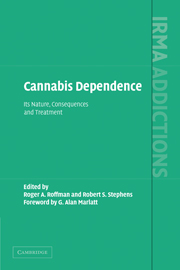Book contents
- Frontmatter
- Contents
- List of Contributors
- Acknowledgments
- Executive Summary
- Foreword
- Part I The Nature of Cannabis Dependence
- Part II Interventions with Cannabis-Dependent Adults
- 6 Cognitive-Behavioral and Motivational Enhancement Treatments for Cannabis Dependence
- 7 Contingency-Management Interventions for Cannabis Dependence
- 8 The Marijuana Check-Up
- 9 Guided Self-Change: A Brief Motivational Intervention for Cannabis Abuse
- 10 Supportive–Expressive Psychotherapy for Cannabis Dependence
- Part III Interventions with Cannabis-Dependent Adolescents and Young Adults
- Part IV Policy
- Part V Conclusion
- Index
10 - Supportive–Expressive Psychotherapy for Cannabis Dependence
from Part II - Interventions with Cannabis-Dependent Adults
Published online by Cambridge University Press: 29 October 2009
- Frontmatter
- Contents
- List of Contributors
- Acknowledgments
- Executive Summary
- Foreword
- Part I The Nature of Cannabis Dependence
- Part II Interventions with Cannabis-Dependent Adults
- 6 Cognitive-Behavioral and Motivational Enhancement Treatments for Cannabis Dependence
- 7 Contingency-Management Interventions for Cannabis Dependence
- 8 The Marijuana Check-Up
- 9 Guided Self-Change: A Brief Motivational Intervention for Cannabis Abuse
- 10 Supportive–Expressive Psychotherapy for Cannabis Dependence
- Part III Interventions with Cannabis-Dependent Adolescents and Young Adults
- Part IV Policy
- Part V Conclusion
- Index
Summary
Supportive–expressive (SE) dynamic psychotherapy forms one variation of a number of psychotherapies that emphasize the importance of effective interpersonal relationships for psychological health (Grenyer, 2002a). The overall goal of SE psychotherapy is to help the client achieve mastery over their difficulties, gain self-understanding, and practice self-control over habitual drug use and related problems. From this framework, cannabis dependence is understood within the context of the client's interpersonal relationships, work, and social problems. The theory behind the SE approach emphasizes the formative influence of life experiences on the development of personality and on the genesis of problems, including habitual cannabis use. Change is brought about through mastering (understanding and controlling) relationship conflicts and problems with a focus on the role of drug use within these interpersonal patterns. The therapist establishes a firm, consistent, and predictable therapeutic framework to strengthen the helping alliance between client and therapist. The therapist maintains this framework by focusing on the client's goals and fostering an understanding of relationship conflicts as they interact with conditions for drug abuse.
There is evidence that supports the SE approach to understanding and treating cannabis dependence. Cannabis dependence may adversely affect interpersonal relationships (Solowij & Grenyer, 2002a). Heavy use during adolescence may produce a developmental lag, entrenching adolescent styles of thinking and coping which can impair one's ability to form adult interpersonal relationships (Baumrind & Moselle, 1985; Kandel & Logan, 1984; Kandel et al., 1986).
- Type
- Chapter
- Information
- Cannabis DependenceIts Nature, Consequences and Treatment, pp. 225 - 244Publisher: Cambridge University PressPrint publication year: 2006
- 1
- Cited by



